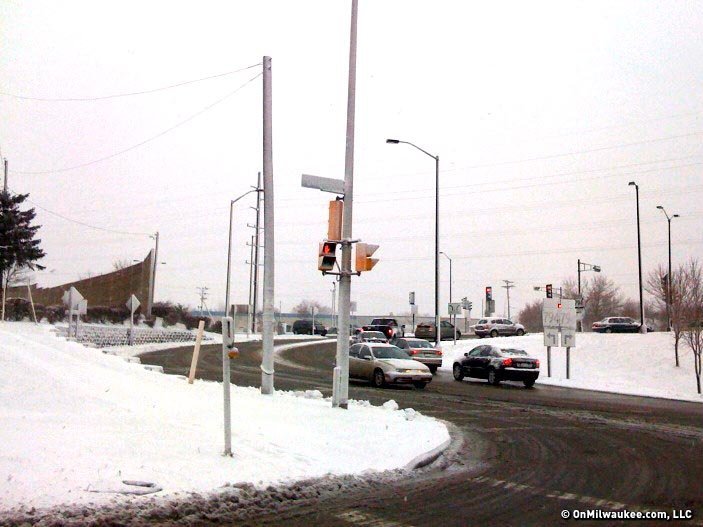Just in time for the first big snow of the year, the Department of Public Works is ready to present its plowing strategy for the coming white season. And it looks like patience will be a mantra for drivers and pedestrians. Aldermen asked DPW to set up a plan after last year's somewhat disjointed approach to plowing.
The plan's priorities are to open mass transit routes and main streets within six to 12 hours after a storm and then get to residential streets within 24 hours. The goal for residential streets is to at least clear the center lane in parking congested areas. The guidelines for those streets were termed "safe and passable, not bare pavement." Getting back to streets with alternate side parking and general clean-up would come within two days, plowing sidewalks crosswalks and alley opening would get done within four days as well as clearing bus stops.
Clearing bus stops and crosswalks was a topic with some contention throughout the year as DPW officials were called on the concrete to explain who was going to do the work, since last year it wasn't getting done in a timely fashion.
The department noted in its report that it added $280,000 to the budget to handle bus stops and crosswalks, as well as 10 more pieces of sidewalk snow equipment and end loaders, and, of course, 10 additional inspectors for quality control issues.
Cops and Schools: The City of Milwaukee and the Milwaukee Public Schools are ready to re-up their agreement to have squads patrol trouble areas at the end of the school day. MPD agrees to provide two-man squads between 3 p.m. and 4:30 p.m. at the discretion of MPS officials.
MPS will pay no more $60,000 next year for the added security. MPS has paid the city $60,000 for the 2006-07 and the 2007-08 school years. A Common Council committee will consider the deal this week.
Privatization Exploitation: Residents in Chicago are getting a grasp on what privatization of major services can do for them -- mainly get grasp on their wallets. The city leased its metered spaces to a private firm for $1.1 billion for 75 years. Most city meters are 25 cents an hour. Those rates got to $1 an hour next year and to $2 an hour by 2013, according to city officials.
Rates in the Loop now run $3 and those will go to $3.50 an hour next year and $6.50 an hour by 2013. City officials have no say over the rates until after 2013. The private operator is actually made up of two Morgan Stanley infrastructure funds.
There were 30,559 metered spots in 2004 bringing $13.6 million to the coffers. That rose to $18.9 million in 2007, according to the city.
One question that comes too mind is why is meter parking cheaper in Chicago than it is in Milwaukee? Milwaukeeans have been paying $1 an hour in the central business district for years already and aldermen eyed increasing the rate as a way to help out their cash-strapped budget. They ended up raising the fine for overnight parking violations.
Taking on Taxis: Amid all the hoopla over garbage and ice removal fee hikes for Milwaukee residents, fees for folks with licensed services appear to be heading skyward, too. A Common Council committee will consider this week more than doubling license fees for public passenger vehicles. Public passenger vehicles are most visible in the form of taxis plying city roads, but also include limousines, handicapped transports, pedicabs and horse and surrey livery services.
The proposal would increase license fees from $165 to $175 and change the length of the license from two years to one year. Renewals would cost $100.
Speaking of taxis, there's good news for folks fond of riding in them. Of 321 taxis inspected by the Police Department, 320 passed inspection. The annual analysis checks on things like cleanliness, whether the heat and air conditioning work and even the thickness of tire tread.
Only 18 cabs failed the first inspection and 17 of those passed the second time around. Joe Sanfelippo, who owns the most cab permits of any single individual in the city through his American United company, had only four cabs that failed first inspections.
Better than White-out: While Gov. Jim Doyle has come under serious fire for using his so-called "Vanna White" or "Frankenstein" veto, which allows him to take out phrases and numbers in the legislative budget to nearly create new legislation, Milwaukee County Exec Scott Walker has been using similar authority with impunity.
Now state Sen. Tim Carpenter (D-Milwaukee) wants to put the screws on Walker's pen, as well. Carpenter authored a referendum asking voters in April if they thought it was a good idea to limit Doyle's veto ability. To no one's surprise, more than 70% did and the governor will have some of the ink taken out of that pen.
Carpenter says he's writing a bill to limit these "creative" vetoes from being used by the county exec and wants to keep that veto power down to what we all assumed a veto would be -- line item. It would require approval from voters and the legislature since the exec's powers are encoded in the state constitution.
"The voters of Milwaukee County, along with the voters of Wisconsin, have consistently expressed their displeasure at using vetoes to create entire new words and phrases that were not included in budget language. The people do not believe this is an appropriate use of executive budgetary authority" he said. "An executive should not be able to suture together letters and words from a budget to create laws never considered by the people's budget-writing representatives, whether such representatives sit in the state legislature or on a county board."
Riverkeeper Sails On: It could give environmentalists a sinking feeling or maybe just a wave of discomfort. Lynn Broaddus announced her departure as executive director of the Milwaukee Riverkeeper group, formally known as Friends of Milwaukee's Rivers. She's going to work for The Johnson Foundation, which runs the Frank Lloyd Wright-designed Wingspread in Racine.
During her five-plus-year tenure, the group increased its activism on the behalf of healthy water in the metro area through courts and public awareness. It also picked up its networking ability and hooked up with other like-minded groups on such high-profile efforts as suing the Milwaukee Sewerage District over its dumping. It also created an urban waterway map identifying optimal spots for paddlers to ply the Milwaukee, Menominee and Kinnickinnic rivers as well as being vigilant in finding sewer outfalls that could dump untreated sewage into the rivers.
Whenever there was a concern about water quality Broaddus and her group were there.
Cheryl Nenn, who has served in the staff position of Milwaukee Riverkeeper for six years, has been named Interim Executive Director while a search for a permanent replacement is conducted.
A Right View: And now from the right comes an economic stimulus proposal from the Wisconsin Leadership Institute, which is pretty much a one-man clearinghouse of all things conservative run by Brian Fraley.
Fraley says the group stresses individual liberties and free markets, which is kind of a cloak that groups use when they want to become independent expenditure attack dogs during political campaigns. In what it calls "common sense measures," the WIL says the state should:
- Eliminate the tax on retirement benefits for citizens over the age of 65.
- Pass public nuisance law reform.
- Lift the nuclear power moratorium.
- Allow Health Savings Account tax deductibility
- Launch a Web site, which lists all state agency expenditures over $100 within 15 days.
The measures should have the Badger State awash in prosperity in no time.
"The first rule of holes is that when you find yourself in one, stop digging," said Fraley. "So the first order of business for the new legislature is to rein in state spending and state agencies that stifle growth."
An avid outdoors person he regularly takes extended paddling trips in the wilderness, preferring the hinterlands of northern Canada and Alaska. After a bet with a bunch of sailors, he paddled across Lake Michigan in a canoe.
He lives in Bay View.



